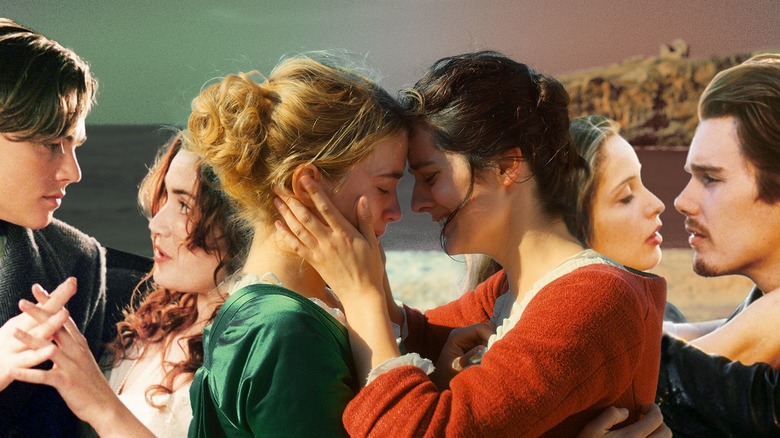
From an emotional standpoint, romantic movies can have several different functions. On the happier end of the spectrum, they can produce feelings of joy, hope, and gratification. Then there are romances that are best described as tearjerkers, with endings that devastate more than delight. But there are also films that fall somewhere in between these two extremes, movies that feel both melancholic and joyful at the same time.
When picking a romantic film to watch, it's important to know what mood you're in -- or what mood you want to be in. With this list, I've compiled a group of films that fall somewhere on the spectrum between bittersweet and tragic. A few of these films have decidedly sad endings where no one ends up happy (or even alive), while others depict a romance that changed an individual's life for the better, regardless of its outcome. What's great about romance films without so-called happy endings is that they highlight the idea of love as a transformative event and underscore the necessity of making the most of every experience.
The movies on this list aren't for romance cynics, but they are for those who like a little sadness sprinkled into their love stories. So, if you feel emotionally ready to do so, dive into this list of the greatest romance films where the main couple doesn't end up together.
In The Mood For Love (2000)
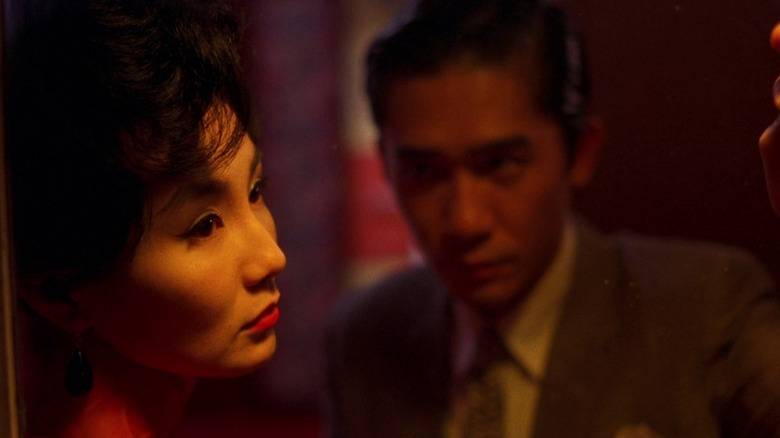
Wong Kar-wai's "In The Mood For Love" is hands-down one of the most beautiful romance films ever created. First off, the film is absolutely stunning to look at, as the film's evocative primary colors tell a rather understated story in vivid hues. The story in question is this: Chow Mo-wan (Tony Leung) is a journalist who has just moved to Hong Kong with his wife, who is often away on business. Chow makes the acquaintance of his neighbor, Su Li-zhen (Maggie Cheung), whose own spouse is also gone frequently because of work. Chow and Su come to realize that their spouses are having an affair. They start spending more time together and find themselves falling in love, but are hesitant to begin an affair of their own.
Chow and Su's love story is a quiet one, and if you're not paying attention, you might miss it. But it's all right there on the screen, if not in the dialogue then in the film's beautiful coloring and cinematography. Chow and Su's time together glows with a pulsating, prosperous red light, while their respective work environments are tempered by cooling greens and blues. But their passion for one another cannot change their circumstances, and a series of missed connections make their eventual separation even more painful. Chow is never truly able to get over his feelings for Su, and his heartbroken existence is explored in Wong Kar-wai's loose sequel to the film, "2046." Within "In The Mood For Love," beauty and pain go hand in hand.
Brief Encounter (1945)
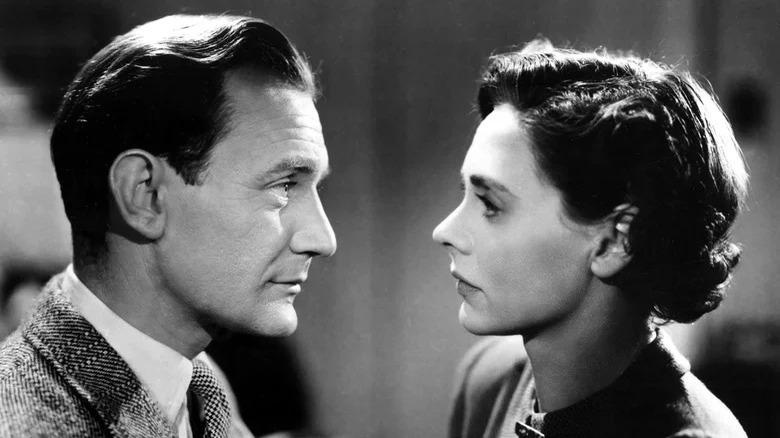
If you're a fan of the 2015 film "Carol," you need to watch "Brief Encounter" right away. And even if you're not a fan of "Carol," you should still put it on your list. "Brief Encounter" is based on Noël Coward's one-act play and is directed by David Lean, a British filmmaker best known for his direction of historical epics. By contrast, "Brief Encounter" is the opposite of an epic and, in fact, takes place on a very small scale. The film follows Laura Jesson (Celia Johnson), a housewife who travels to the city each week on the train. While at the station, she meets Alec Harvey (Trevor Howard), a doctor in town on business. Their accidental meeting soon develops into something deeper, and they both realize they've wandered into something much more dangerous: true love.
As in the film "Carol," "Brief Encounter" starts and ends with the same scene. Laura and Alec are preparing to say their goodbyes when they are interrupted by a bothersome friend of Laura's. Unable to say how they truly feel, Alec puts his hand on Laura's shoulder and departs. As Laura narrates the events that led up to this final moment between them, we come to realize just how brief their relationship really was -- and just how meaningful.
Laura describes falling in love with Alec in almost apocalyptic terms. "I didn't think such violent things could happen to ordinary people," she muses. "Brief Encounter" is the perfect example of doing a lot with very little -- all you need are two brilliant actors and a train station, and a masterpiece is born.
Titanic (1997)
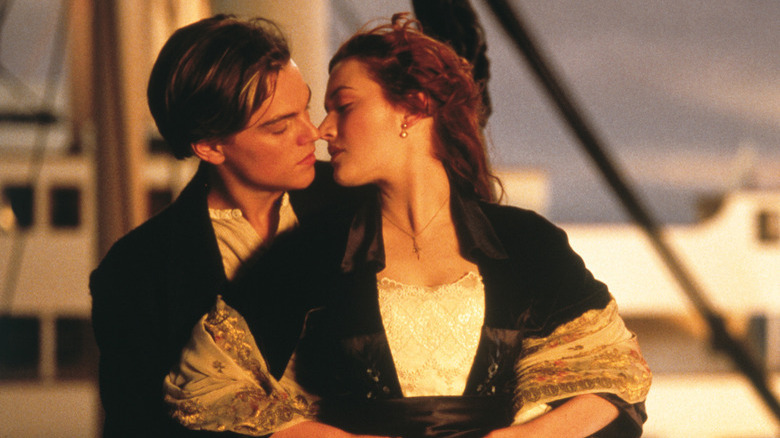
A list of this nature wouldn't be complete without one of the most beloved romances in film -- the love story of Jack and Rose in James Cameron's epic, "Titanic." While there are several different genres running through "Titanic," it's the romance that holds it all together. When she first boards the Titanic, Rose (Kate Winslet) is a wealthy young woman engaged to be wed to a rather awful fellow, Cal (Billy Zane). Feeling hopeless about the future that's been laid out for her, Rose contemplates suicide one night, only to be saved by a penniless young man with a taste for adventure, Jack (Leonardo DiCaprio).
As Rose puts it later in the film, "He saved me, in every way that a person can be saved." First, there are the two instances in which Jack literally saves Rose's life, during their first meeting, and while the Titanic is sinking. But Rose is also talking about a figurative kind of saving -- Jack gave her the freedom to live her life on her own terms and have every adventure she ever wanted to have.
Even if you've never seen "Titanic" before, it's pretty much guaranteed that you know how it ends. The Titanic sinks, and Jack makes sure Rose is safely above water on a door while he meets his frigid death. But, in retelling the story at an old age, Rose doesn't seem saddened by Jack's death, at least not anymore. It's a love story about freedom and empowerment, even if only one of them gets to live out that dream.
If you or anyone you know is having suicidal thoughts, please call the National Suicide Prevention Lifeline by dialing 988 or by calling 1-800-273-TALK (8255).
Portrait Of A Lady On Fire (2020)
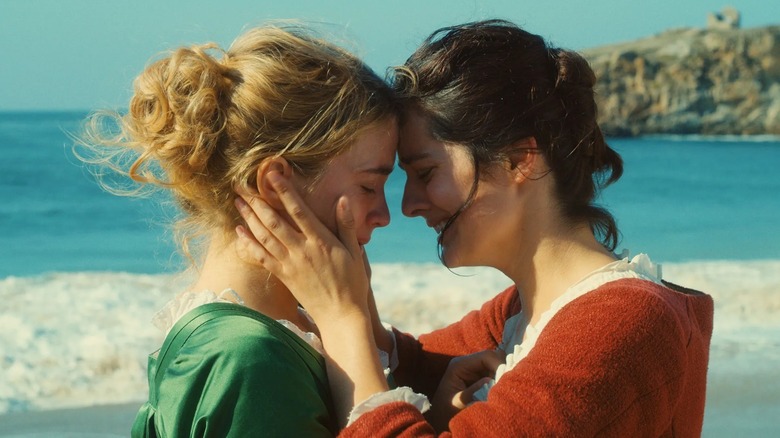
While "Titanic" and "Portrait of a Lady On Fire" might not seem like they have a lot in common, director Céline Sciamma begs to differ. They are both films without quote-on-quote "happy" endings, and they both cover similar themes. Explaining why "Titanic" was on her mind while making "Portrait of a Lady On Fire," Sciamma explained that they're both about emancipation, noting that "the success of a love story is not about how long it lasts."
"Portrait of a Lady On Fire" illustrates this concept in the most stunning way imaginable. Noémie Merlant plays Marianne, an 18th-century painter who is sent to a remote island to compose a portrait of Héloïse (Adèle Haenel), a young woman who is betrothed to a man she has never met. Marianne attempts to create the portrait in secret, stealing furtive glances at Héloïse on their daily walks. When Héloïse discovers the truth, it only brings the two women closer, and as the date of Marianne's departure grows near, they find themselves at the mercy of a brief, yet powerful, love affair.
Like "Titanic," "Portrait of a Lady On Fire," is about the memory of a love story, as Marianne narrates her experience and describes how much Héloïse meant -- and still means -- to her. The final scene in the film is nothing short of exquisite. Marianne spots Héloïse in a theater, waiting to hear a piece of music that means so much to both of them. Marianne tells us up front that Héloïse never saw her, and we are instead left to sit with Héloïse's own recollections -- of passion, of equality, of freedom.
Desert Hearts (1985)
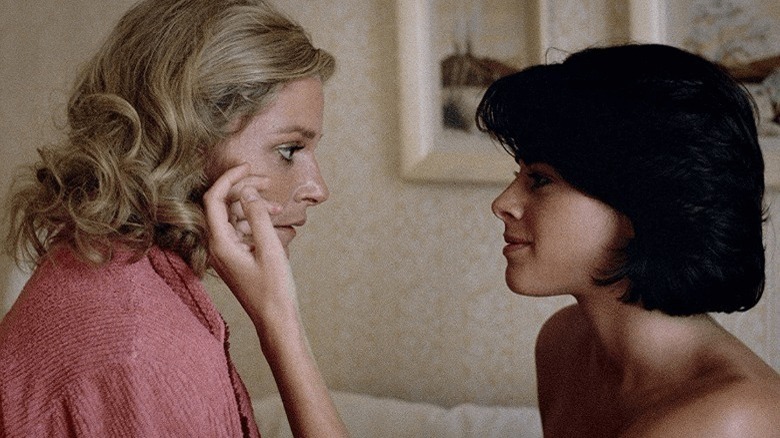
Donna Deitch's 1985 film "Desert Hearts" is often categorized as the first lesbian movie with a happy ending, and that fact alone makes it worth watching. Being one of the most influential LGBTQ+ movies aside, "Desert Hearts" is a stunning love story with a bittersweet -- yet hopeful -- ending.
The year is 1959. Helen Shaver plays Vivian, a professor from New York who travels to Reno, Nevada in order to get a divorce. While staying at a ranch run by Frances (Audra Lindley), Vivian meets Cay (Patricia Charbonneau), a young artist who throws her off balance. The uptight Vivian and the free-spirited Cay make a dynamic pair, and they both teach each other a little something about how to live more fearlessly.
A desert love story like no other, the film is full of warmth, both literally and figuratively. Cay starts breaking down Vivian's walls, and the vast desert doesn't feel so lonely anymore. The film was shot by master cinematographer Robert Elswit, who frames the beautiful landscapes -- as well as the women in them -- as if they were paintings. It may not exactly be easy for Vivian and Cay to be together in mid-century America, but by the end of the film, they both feel empowered enough to face whatever the future may bring, even if it includes being separated from one another.
Casablanca (1942)
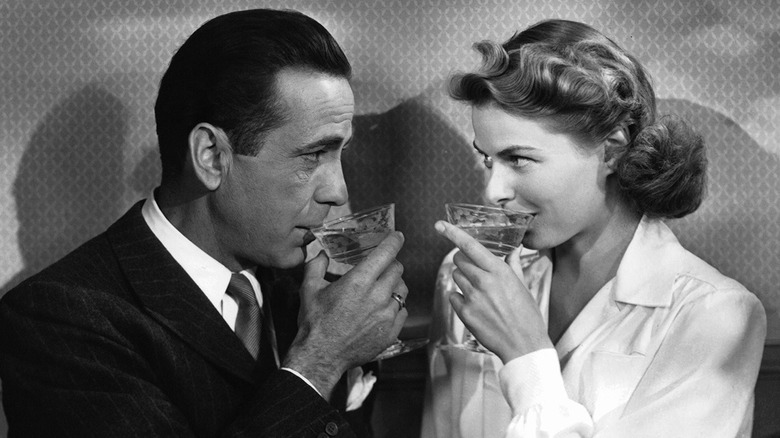
"Casablanca" is often considered one of the greatest romance films of all time, and it's hard to argue with that. Whether it's all those quotable lines or Humphrey Bogart's wistful drawl, a classic like "Casablanca" never gets old. Bogart plays Rick Blaine, an American ex-pat who lives in Casablanca and owns a nightclub there during World War II. Rick runs into Ilsa (Ingrid Bergman), his long-lost love, who arrives with her husband Victor Laszlo (Paul Henreid). Laszlo is a Czech Resistance leader and a fugitive and has come to Casablanca to avoid arrest and gain safe passage to America.
Rick is angry with Ilsa for running off on him in Paris, but he softens up when he learns the real reason she left. Ilsa wants to stay in Casablanca with Rick while Laszlo escapes, but Rick urges her to go, saying that she'll regret it if she stays. Like many of the great melancholic love stories, "Casablanca" is more about the memory of a great love than it is about the romance itself. As Bogart's famous line goes, "We'll always have Paris." And we'll always have the heartbreaking work of art that is "Casablanca."
Weekend (2011)
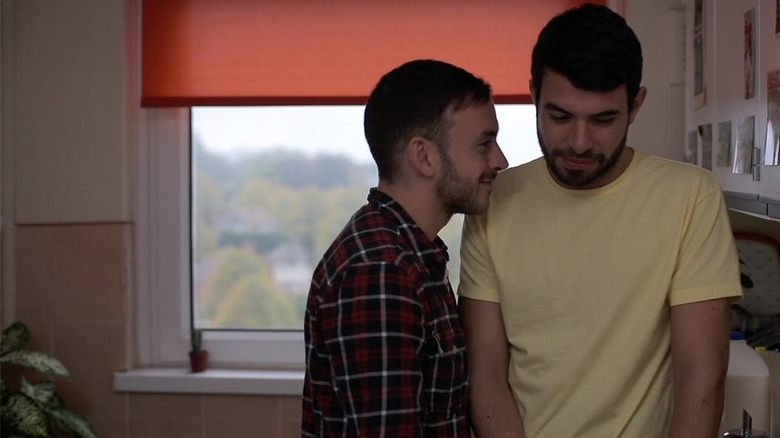
Falling in love over the course of only a few days may seem too fantastic to be true, but when it works, it works. Andrew Haigh's "Weekend" is a tender love story with all the makings of an enduring romance -- except it only lasts two days. The film follows Russell (Tom Cullen) and Glen (Chris New), who meet at a club on a Friday night. They embark on what would normally be a one-night stand, but instead of parting ways the next morning, they spend the entire weekend together.
The two men are very different, and they both have their own hangups about relationships and intimacy. Russell grew up in foster care and never had the opportunity to come out to a parental figure, and he feels a lot of shame about his sexual identity. Glen is an artist who was in a bad relationship and has since sworn off boyfriends altogether. Glen is in the midst of an art project where he has his hook-ups speak about their experiences into a voice recorder, something the generally reserved Russell is perplexed by.
There is an expiration date on the relationship from the beginning -- Glen is leaving for America on Sunday and Russell has a birthday party to attend -- but these constraints only make their affair all the more intimate. It's a wonderfully raw exploration of what it means to carry shame and fear, while also illuminating the joy of true communion with another person.
Romeo + Juliet (1996)
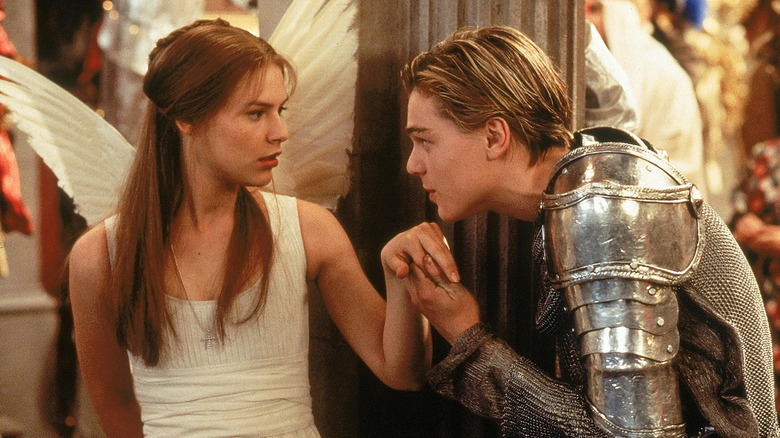
Romeo and Juliet are one of the first great tragic romances, so it wouldn't be right to exclude them from this list. There have been several adaptations of Shakespeare's famous play, but I'm going to start with the one that is the most joyful, despite the tragic fate of our young heroes. Baz Luhrmann's 1996 film is a technicolor whirlwind set in the fictional Verona Beach. The film takes place in contemporary times (or at least the 1990s), and the seeming contradiction between Shakespeare's antiquated dialogue and the film's modern setting only makes it more enchanting.
An energetic Leonardo DiCaprio plays Romeo, while the doe-eyed Clare Danes plays Juliet, locked in a gilded cage of her family's making. The set pieces in the film are amazing, and every character performs Shakespeare's words as if they were meant to be spoken in this setting. In this iteration of the play, Montague is a drag queen, with Harold Perrineau nearly stealing the show with his brilliant performance of the famous sidekick.
What makes the film such a successful adaptation is how evocatively it depicts the passion of young love. There's a long distance to travel from falling in love with someone to dying by suicide because of that person less than a week later, but the performances of all involved make those heightened stakes feel somehow believable. It's the perfect combination of agony and ecstasy, tied together in a psychedelic bow.
If you or anyone you know is having suicidal thoughts, please call the National Suicide Prevention Lifeline by dialing 988 or by calling 1-800-273-TALK (8255).
West Side Story (2021)
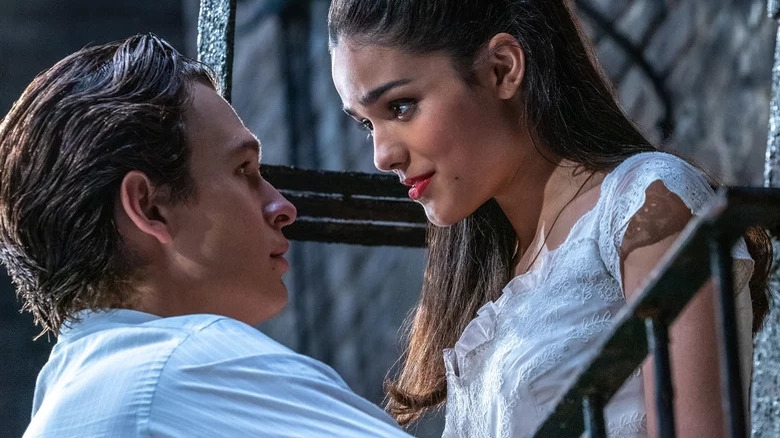
Baz Luhrmann's 1996 film may be the most popular straight take of "Romeo and Juliet," but "West Side Story" is arguably the best-known loose adaptation. First conceived of as a play in the late '50s, "West Side Story" was then made into a smash-hit film that was released in 1961. Filmmaking legend Steven Spielberg then made a remake of the film in 2021. I'm going to focus on the Spielberg film here; not because I think it's the superior version, but because I think it's a remake well worth watching. Some even consider it one of Spielberg's best films in his storied career.
The story focuses on two young people, Tony (Ansel Elgort) and Maria (Rachel Zegler), who find themselves caught up in a fight between two rival gangs in New York City. Tony was once a part of the Jets, a white gang fighting to keep outsiders out of their turf, while Maria's brother, Bernando (David Alvarez), is the leader of the Puerto Rican gang, the Sharks. In Spielberg's remake, the film is as much about gentrification as it is about culture clashes and racism, as both sides fight to maintain their space within a rapidly changing city.
Obviously, Tony and Maria don't get their happy ending, and the fighting between the gangs escalates to a deadly pitch. "There's A Place For Us" becomes a dream unfilled, and we are left with the wake of a love story cut short, rather than the hopeful ambiguity of the future.
Broadcast News (1987)
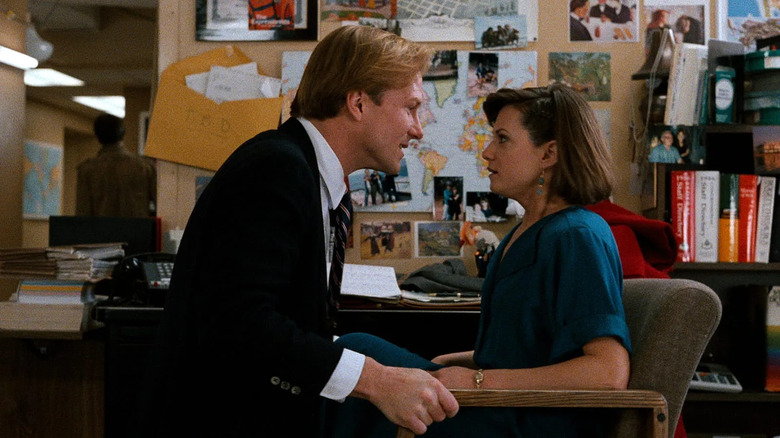
"Broadcast News" is the only film on this list that could conceivably be considered a rom-com, and I have no problem making the claim that it's the greatest rom-com ever made. Holly Hunter plays Jane, a fast-talking (and fast-moving) news producer in Washington D.C. Jane's best friend is Aaron (Albert Brooks), a talented reporter who doesn't do well in front of the camera. The newsroom is faced with the arrival of a newcomer, Tom (William Hurt), an anchorman who has coasted by on his good looks and charm.
Despite the fact that Tom represents everything Jane thinks is wrong with news media, Jane begins to fall for him almost against her will. This creates problems between her and Aaron, who similarly dislikes Tom, but also harbors secret feelings for Jane. Jane is also extremely ambitious and dedicated to her career, and finds it difficult to balance her changing relationships with these men.
I don't want to spoil the ending too much here, but considering the premise of this article, you can probably guess that Jane doesn't end up with either of them. The final nail in the coffin for Jane and Tom is one of the most brilliantly constructed narrative revelations ever put to screen, and it solidifies who these characters are and have always been at their core -- and why they will never work together. The film's epilogue ending is either deeply cynical or totally optimistic -- it all depends on your perspective.
And Then We Danced (2019)
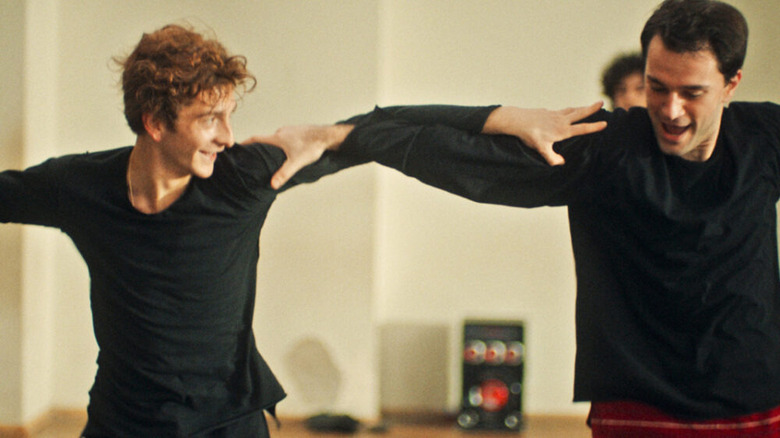
Levin Akin's "And Then We Danced" is a little bit like "Black Swan" without all the horror, and I mean that in the most complimentary way possible. The film follows Merab (Levan Gelbakhiani), a young man training as a Georgian dancer at the national academy. Merab's concentration is broken with the arrival of newcomer Irakli (Bachi Valishvili), a replacement dancer for the troupe.
Irakli isn't especially popular with the other dancers because of his cocky attitude, but his talent leads him to replace Merab in one of their dances. Merab initially sees Irakli as a bitter rival, but they soon begin to grow close and become lovers as they compete for a spot in the main ensemble. Merab comes to understand the danger of their relationship when he learns the previous candidate for the spot was fired for having sex with a man and has since become destitute.
Merab and Irakli's relationship eventually falls apart, but Merab is committed to exploring his identity on his terms. As Merab grows more and more confident about who he is, he must decide if Georgian dancing is really the right path for him. Though a successful romance wasn't in the cards for Merab this time, maybe a future where he can finally be himself is.
The Umbrellas Of Cherbourg (1964)
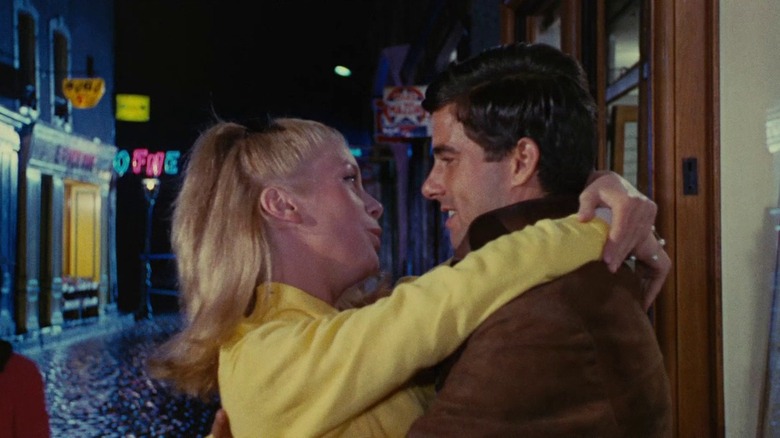
If you're a fan of "La La Land" (or even if you're not), you've got to check out the films of Jacque Demy, the filmmaker whose body of work clearly inspired Damien Chazelle's 2016 musical. Like "La La Land," Demy's 1964 film "The Umbrellas of Cherbourg" is a musical romance shot in stunning technicolor. And, of course, the two leads do not end up together.
The film is set in the titular city of Cherbourg and follows Geneviève (Catherine Deneuve), a young woman who works in an umbrella shop with her mother. Geneviève falls in love with Guy (Nino Castelnuovo), a mechanic who is drafted to go fight in the Algerian War. While Guy is away, Geneviève learns that she is pregnant with Guy's baby, and is worried about her future prospects. At the urging of her mother, (Anne Vernon), Geneviève decides to marry Roland (Marc Michel), a wealthy jeweler who can provide for her and her child.
Geneviève and Guy's connection did not come at the right time, and they are both forced to go on with their lives without the other person in it. The story is told mostly through song, with the lyric-heavy music exploring the predicaments each character finds themselves in. Stunning to look at and pleasing to listen to, "The Umbrellas of Cherbourg" is a masterpiece of melancholy romance.
Before Sunrise (1995)
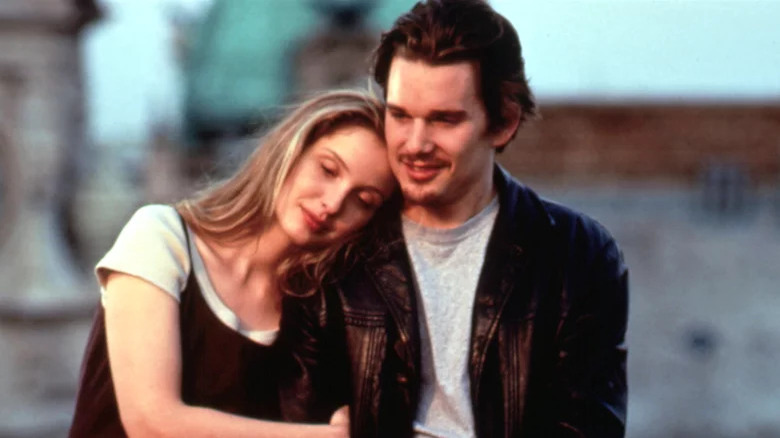
Richard Linklater's 1995 film "Before Sunrise" does quite literally depict a love story where the main couple doesn't end up together at the end, but it's a little more complicated than that. "Before Sunrise" is part of a trilogy of films and is followed by "Before Sunset" and "Before Midnight," which continue the story of the lead characters. But, taken on its own, "Before Sunrise" depicts a love story that is cut short before it can fully blossom.
Inspired by Linklater's own tragic missed connection, the film follows young American Jesse (Ethan Hawke), who meets a French student named Céline (Julie Delpy) on a train. Jesse convinces Céline to get off the train with him in Vienna, and they decide to spend the day (and night) together before Jesse's flight the following morning. Neither has enough money for a hotel room, so they spend the evening roaming the city and talking.
The film is shot in a cinéma vérité style, and most of the runtime consists of the pair discussing various philosophical subjects. That might sound like a drag on paper, but in reality, Hawke and Delpy's chemistry is sizzling, and their conversations feel totally natural and spontaneous. Though they have a wonderful evening together, they decide not to exchange information and instead agree to meet at the same train station in six months' time. What happens next? You'll just have to watch the rest of the trilogy to find out.
Read this next: The 19 Greatest Movie Couples Of All Time Ranked
The post The Best Romance Movies Where The Couple Doesn't End Up Together appeared first on /Film.
0 Commentaires